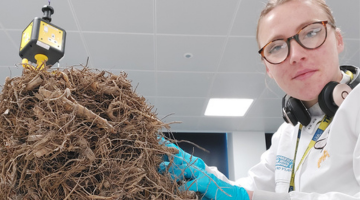2024/25 entry
BSc (Hons) Biochemistry with Foundation Year
Clearing
Want to study with LJMU this September? Visit our Clearing hub to apply now if you have your grades or register your interest and become a Clearing Insider to receive updates while you wait for your results. Your journey starts with Clearing.
Minimum UCAS points required: TBC
Why study Biochemistry with Foundation Year at Liverpool John Moores University?
- £6 million invested in state-of-the-art teaching facilities
- Opportunities to undertake a year's industrial placement or Erasmus placement
- Stepping stone to more specialist MSc study in Industrial Biotechnology or Cosmetic Science
- International Foundation Year course available offering direct progression onto this degree programme - visit LJMU's International Study Centre to find out more
About your course
The BSc (Hons) Biochemistry with Foundation Year at Liverpool John Moores University is the ideal course if you are interested in this subject but lack the necessary qualifications to study it at degree level.
About the Foundation Year
The Foundation Year is ideal if you have the ability to study for a degree but do not have the qualifications to enter directly onto the Biochemistry honours degree programme.
Once you pass the Foundation Year you will progress directly onto the first year of the honours degree. If you are a full-time UK student, you will qualify for student financial support for the full duration of your course (subject to eligibility criteria).
About the BSc (Hons) Biochemistry degree
The study of biochemistry will appeal to you if you are interested in the biochemical workings of living organisms, cellular metabolism, genomics and proteomics and the biochemical nature of disease. It draws on the different disciplines of cellular biology, physiology, genetics, microbiology, molecular biology and medical biochemistry. This provides a solid grounding for more specialist MSc study in, for example, industrial biotechnology, virology, immunology and genetics.
Option modules in Levels 5 and 6, and the opportunity for individual research and work placements, allow you to specialise in your own particular areas of interest.
The opportunity to take a year out in industry gives you invaluable paid work experience and the chance to put the skills and knowledge you have developed into practice. Most employers prefer to take on graduates who have had this experience.
"I have enjoyed every minute of my Biochemistry degree. It is challenging and rewarding and the opportunities to gain experience in the practical work are invaluable."
Professional accreditation/links
This course is approved and accredited by the Health and Care Professions Council and the Institute of Biomedical Science.
Our links with local hospitals, public health and private laboratories ensure that course content is informed by the latest research and developments in todays biomedical science industry and tailored to the needs of employers. Our connections include the Walton Centre of Excellence in Neurology and Neurosciences, the Roy Castle Foundation Laboratories for research into lung cancer, Alder Hey Children's Hospital and Glaxo/Wellcome Laboratories.
Fees and funding
There are many ways to fund study for home and international students
Fees
The fees quoted above cover registration, tuition, supervision, assessment and examinations as well as:
- Library membership with access to printed, multimedia and digital resources
- Access to programme-appropriate software
- Library and student IT support
- Free on-campus wifi via eduroam
Additional costs
Although not all of the following are compulsory/relevant, you should keep in mind the costs of:
- accommodation and living expenditure
- books (should you wish to have your own copies)
- printing, photocopying and stationery
- PC/laptop (should you prefer to purchase your own for independent study and online learning activities)
- mobile phone/tablet (to access online services)
- field trips (travel and activity costs)
- placements (travel expenses and living costs)
- student visas (international students only)
- study abroad opportunities (travel costs, accommodation, visas and immunisations)
- academic conferences (travel costs)
- professional-body membership
- graduation (gown hire etc)
Funding
There are many ways to fund study for home and international students. From loans to International Scholarships and subject-specific funding, you'll find all of the information you need on our specialist funding pages.
A DBS check is not required for your application, however a DBS may be required for modules where there is a work based learning placement option. Work based learning placements that do not require a DBS check are available.
Employability
Pharmaceutical companies and others involved in the food, cosmetics and toiletries industries, such as MedImmune, Novartis Vaccines, AstraZeneca, Unilever and Bristol-Myers Squibb, employ many of our biochemistry graduates directly.
Some graduates prefer to continue their studies with postgraduate study (PGCE/PGDE, MSc, MPhil, MRes or PhD) in topics as wide ranging as tropical medicine, cardiovascular disease, biomedical sciences, oncology, biotechnology, toxicology, virology and cosmetic science.
Alternatively, many decide to pursue teacher training as there is currently a shortage of well-qualified science teachers. Some have even moved into patenting, marketing, management and merchant banks, and many have gone on to research degrees in the UK or abroad.
You may also wish to use your qualification to undertake further study or training before entering employment.
Student Futures - Careers, Employability and Enterprise Service
A wide range of opportunities and support is available to you, within and beyond your course, to ensure our students experience a transformation in their career trajectory. Every undergraduate curriculum includes Future Focus during Level 4, an e-learning resource and workshop designed to help you to develop your talents, passion and purpose.
Every student has access to Careers Zone 24/7, LJMU's suite of online Apps, resources and jobs board via the LJMU Student Futures website. There are opportunities for flexible, paid and part-time work through Unitemps, LJMU's in-house recruitment service, and we also offer fully funded Discovery Internships.
One-to-one careers and employability advice is available via our campus-based Careers Zones and we offer a year-round programme of events, including themed careers and employability workshops, employer events and recruitment fairs. Our Start-Up Hub can help you to grow your enterprise skills and to research, plan and start your own business or become a freelancer.
A suite of learning experiences, services and opportunities is available to final year students to help ensure you leave with a great onward plan. You can access LJMU's Careers, Employability and Start-up Services after you graduate and return for one-to-one support for life.
Go abroad
LJMU aims to make international opportunities available to every student. You may be able to study abroad as part of your degree at one of our 100+ partner universities across the world. You could also complete a work placement or apply for one of our prestigious worldwide internship programmes. If you wanted to go abroad for a shorter amount of time, you could attend one of our 1-4 week long summer schools.
Our Go Citizen Scheme can help with costs towards volunteering, individual projects or unpaid placements anywhere in the world. With all of these opportunities at your feet, why wouldn’t you take up the chance to go abroad?
Find out more about the opportunities we have available via our Instagram @ljmuglobalopps or email us at: goabroad@ljmu.ac.uk.
A life-changing experience
There's so much more to university than just studying for a degree.
News and views
Browse through the latest stories and updates from the University and beyond
What you will study on this degree
Please see guidance below on core and option modules for further information on what you will study.
Further guidance on modules
Modules are designated core or optional in accordance with professional body requirements, as applicable, and LJMU’s Academic Framework Regulations. Whilst you are required to study core modules, optional modules provide you with an element of choice. Their availability may vary and will be subject to meeting minimum student numbers.
Where changes to modules are necessary these will be communicated as appropriate.
Level 3
Core modules
Further Chemistry
20 credits
This module covers fundamental organic chemistry concepts.
Level 5
Core modules
Molecular Biology and Functional Genomics
20 credits
This module provides you with a detailed understanding of the molecular mechanisms that are applicable to human disease states, development and genetic engineering. The module will empower you to demonstrate a critical understanding of genomic integrity and human disease. Transcriptional control, developmental biology, genetic engineering and bioinformatics will be introduced. You will encounter experimental methods for the investigation of the relevant areas of biochemistry and molecular biology using data from high-throughput techniques.
Level 6
Optional Modules
Cancer
20 credits
This module aims to enable students to develop an understanding of the underpinnings of key molecular and cellular events during the initiation and progression of cancer and to provide an appreciation of the diagnostic techniques and therapies available. The module also aims to consolidate your prior learning in genetics, histology, cell biology, molecular biology, chemistry, and biochemistry within a disease model.
Teaching and work-related learning
Excellent facilities and learning resources
We adopt an active blended learning approach, meaning you will experience a combination of face-to-face and online learning during your time at LJMU. This enables you to experience a rich and diverse learning experience and engage fully with your studies. Our approach ensures that you can easily access support from your personal tutor, either by meeting them on-campus or via a video call to suit your needs.
Teaching at all levels is via lectures, lab sessions, workshops, tutorials, and online which account for approximately 15-20 hours study time each week; the rest of your time should be spent in private study.
Workshops and small-group tutorials give you a chance to discuss course material more informally and your personal tutor will also organise twice yearly one-to-one tutorials with you.
Work-related Learning
As part of your work-related learning, we highly recommend that you opt to undertake a years work placement after your second year. This will not only give you a chance to put into practice what you have learnt at the University but it will also help you develop your personal skills, earn a salary while taking a years break from formal study, and add real value to your CV.
Support and guidance
Dedicated personal tutor, plus study skills support
Throughout your course, you will have the support of a personal tutor who will be available to discuss course-related matters in both tutorial sessions and on a one-to-one basis. If you opt to take a year out on work placement, this will be coordinated for you by a placement tutor and during the year you will have ongoing support from a member of staff, which will include visits to your workplace.
The school is fully committed to promoting a learning environment that supports a culture of equality, diversity and inclusivity (EDI) and has a Disability Support Coordinator, an EDI Coordinator and a School EDI Working Group. Personal Tutors also play a vital role in promoting awareness of support services for students.
Assessment
Assessment varies depending on the modules you choose, but will usually include a combination of exams and coursework.
Exams are normally held at the end of each year and can be in the form of multiple choice, short answer, interpretative, problem-based learning or essay questions.
Coursework assessments could include phase tests, fieldwork/practical reports, data handling, oral presentations, poster presentations, group discussions, essays or the evaluation of your practical skills, and are based on individual assignments though some require group work.
Feedback on coursework assessments is normally provided within three weeks of submission and may be via Canvas (our virtual learning environment), face-to-face or in writing. We believe that constructive feedback is vital in helping you identify your strengths as well as the areas where you may need to put in more work.
Course tutors
Our staff are committed to the highest standards of teaching and learning
Dr Iain Hargreaves
Senior Lecturer
Dr Hargreaves has worked in the field of metabolic disease since 1995 when he began a postdoctoral fellowship to study mitochondrial metabolism at the Institute of Neurology, London. In 1997, he joined the Neurometabolic Unit, National Hospital as a principal clinical scientist to run the mitochondrial disease biochemical diagnostic service. In 2005, he established the first coenzyme Q10 NHS diagnostic service and became an Honorary Senior Lecturer at University College of London. Iain joined LJMU as a Senior Lecturer in Biochemistry and Biomedical sciences in 2016 and now hold a readership in clinical biochemistry. His research interests are focussed on mitochondrial and coenzyme Q10 metabolism and their involvement in disease. In addition, he is also involved in the development of therapeutic strategies to ameliorate mitochondrial dysfunction and oxidative stress in metabolic diseases that may be translatable into clinical practice.
As a lecturer I am afforded the opportunity to include research led learning into my teaching. This involves discussing current research that is relevant to the topic of study as well as referring to metabolic diseases to highlight the importance of biochemical pathways in maintaining the health of an individual
Facilities
What you can expect from your School
You will study at the Byrom Street site in the university's City Campus in the heart of Liverpool. Our state-of-the-art laboratories and teaching spaces will ensure you enjoy a first-class study environment. The Avril Robarts library is within easy walking distance and here you'll find all the information you need to support your studies.
The university reserves the right to withdraw or make alterations to a course and facilities if necessary; this may be because such changes are deemed to be beneficial to students, are minor in nature and unlikely to impact negatively upon students or become necessary due to circumstances beyond the control of the university. Where this does happen, the university operates a policy of consultation, advice and support to all enrolled students affected by the proposed change to their course or module.
Further information on the terms and conditions of any offer made, our admissions policy and the complaints and appeals process.











.png)
